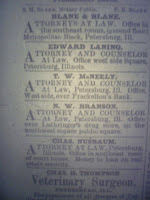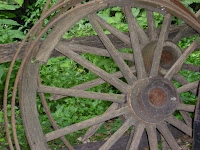Touching Lincoln
One of the most interesting discoveries of this trip was finding out more about the Salzensteins, the family of our great-great grandmother (Carla's paternal great grandmother), Sarah Salzenstein. We learned that there were three Salzenstein brothers who emigrated from Germany (Halsdorf, Hessen)(also called Hesse Cassel), through Baltimore, arriving in the Sangamon Valley in 1831, among the earliest Jewish families in the area. The Salzenstein brothers were Elias, Louis, and Jacob and they each settled in a different town, all within 20 miles of Springfield. Louis's wife, Minnie, was the first German-speaking woman in the area. (A fourth brother, Solomon, remained in Germany, but after he died in 1864 his widow, Henrietta, and daughter, Sophie, came to the Sangamon Valley.)
Elias was the oldest brother (1792 - 1873), married to Jeanette Weil (1823-1894) (also from Germany) and the father of Sarah Salzenstein (1846 - 1908). Sarah (sometimes referred to as "Alice" or "Mary"), had a sister Betty (also called "Bessie") (1842-1933) and brothers Emanuel (1853-1933) and Albert (1859 -1915). Sarah came to the US in ___, and arrived in Illinois when she was 14 in about 1849.
Abraham Nusbaum (1827 - 1896) came to the US in ___ from Bavaria, first settling in Cincinatti where his father, Baer (or Bernhard) Nusbaum was a cattle trader. Sarah Salzenstein and Abraham Nusbaum married in _____ and first lived in Salisbury, where Elias had settled and ran a store. Their first child, Moses, was born in Salisbury in 1855. They moved to Petersburg, where Abe was a storekeeper, and Charles, our great grandfather, was born in 1859. Abe Nusbaum ran his store in Petersburg until about 1874. He died at age 69 in 1896 (the death certificate says he died of stomach cancer after a year-long illness).
Sarah's brother Albert was "a prominent member of the Sangamon county bar" after graduating high school in Springfield and apprenticing with a law firm. He was admitted to the bar in 1880 and became the city attorney of Springfield in 1881. Her brother Emanuel was "one of Springfield's most respected citizens". He started out in the business of "buying and selling of cattle" and then came to Springfield to start a livery business which evolved into an "automobile storage business". "His ability and fairness attracted a large trade" and he supplied the national guard with horses for their summer encampments. Sarah's sister Betty (Bessie) married Benjamin Nusbaum (Abe Nusbaum's brother) and they lived in Springfield, where Benjamin worked in the cattle trading business with Emanuel..
Abraham Nusbaum (1827 - 1896) came to the US in ___ from Bavaria, first settling in Cincinatti where his father, Baer (or Bernhard) Nusbaum was a cattle trader. Sarah Salzenstein and Abraham Nusbaum married in _____ and first lived in Salisbury, where Elias had settled and ran a store. Their first child, Moses, was born in Salisbury in 1855. They moved to Petersburg, where Abe was a storekeeper, and Charles, our great grandfather, was born in 1859. Abe Nusbaum ran his store in Petersburg until about 1874. He died at age 69 in 1896 (the death certificate says he died of stomach cancer after a year-long illness).
Sarah's brother Albert was "a prominent member of the Sangamon county bar" after graduating high school in Springfield and apprenticing with a law firm. He was admitted to the bar in 1880 and became the city attorney of Springfield in 1881. Her brother Emanuel was "one of Springfield's most respected citizens". He started out in the business of "buying and selling of cattle" and then came to Springfield to start a livery business which evolved into an "automobile storage business". "His ability and fairness attracted a large trade" and he supplied the national guard with horses for their summer encampments. Sarah's sister Betty (Bessie) married Benjamin Nusbaum (Abe Nusbaum's brother) and they lived in Springfield, where Benjamin worked in the cattle trading business with Emanuel..
Sarah's uncle, Louis Salzenstien, was a cattle trader and storekeeper in Athens (pronounced with a long a). The store, now the Long Nine Museum, was named so because Abraham Lincoln and eight of his fellow legislators from the Sangamon Valley, all quite tall, had a banquet there in 1836-37. Louis Salzenstein bought the store in the 1830's and became friends with Lincoln, who is said to have delivered mail to the store. Lincoln also visited the store as he rode circuit around the area. There is a story that Lincoln borrowed an ax from Louis. When Lincoln came back later to tell Louis that he had lost the ax, Louis told Lincoln not to worry and refused payment for the lost ax.
 |
| Salzenstein store next door (now Long Nine Museum) |
 |
| Louis & Minnie Salzenstein's home, Athens |

This memorial gate in front of the Athens American Legion Hall was dedicated to Sol and Albert Salzenstein. Sol's headstone says he died in 1918. Albert was Sarah's brother, and Sol a cousin.
At the same time Louis had his store in Athens, Abe Nusbaum had a store in Petersburg, and Samuel Stern (Carla's paternal great grandfather) had a store in Lincoln, in Logan County, about 60 miles from Springfield. Louis's store was the most famous, because of its connection to Lincoln. We learned more about how such stores worked from an article in the Chicago Jewish History newsletter written by Louis' great-great nephew. Louis made trips on a flatboat from Beardstown down the Illinois, Mississippi and Ohio Rivers to St. Louis and Cincinnati to purchase goods and brought them back the same way. These trips would often take a month or longer.
The three Salzenstein brothers, Abe Nusbaum and his brother Benjamin, the Lillensteins (Moses' business partner) and Charles Stern, also from Springfield, were among a handful of Jewish families who settled in the area by 1860. They started a Jewish synagogue in Springfield, B'rith Shalom, serving the whole Sangamon Valley. The synagogue started with services in German and Hebrew but before long adopted English (with alternate services in German). The families continued their association with the synagogue throughout their lifetimes, and a rabbi from Springfield officiated at weddings and funerals.
These families did business together, prospering as cattle traders, stock traders, livery keepers and storekeepers, and their families became further connected through marriages. Both Benjamin Nusbaum and Abe Nusbaum married Salzensteins. There were marriages between the Salzensteins and Lillensteins. They served on the boards of banks and other business ventures, like coal companies. The wives were members of philanthropic women's clubs. Some of their children, like Moses Nusbaum (Charles' brother) and Meyer Lillenstein continued in the cattle trading business and others, like Louis and Elias Salzenstein, continued in the storekeeping business. A few sons, like Charles Nusbaum (1860-1924) (our great grandfather) and Albert Salzenstein (his uncle), apprenticed with lawyers or attended law school and after a time became members of the Illinois State Bar, setting up practice in the county seats.
Charles Nusbaum married Clara Stern, from Lincoln in 1893 (Albert Salzenstein was a witness) and after a few years of small town law practice, became State's Attorney for Menard County (1888-1896). Carl, our grandfather, was born in 1896. Charles became an attorney for the Chicago & Alton Railroad, and the family moved to Chicago in when Carl started at the university there, before World War I.. Carl and Hermien married in 1916, before he went to sea. At age 64, Charles died suddenly from heart failure on the golf course in 1924, leaving his wife Clara ("Granny Nusbaum") and son Carl quite well off financially.
Mose continued to live in Petersburg, most likely with his mother Sarah after Abe died, and continued as a cattle trader and investor in farming and ranching properties with Meyer Lillenstein. After Sarah died in 1908 (pneumonia) at age 73, Mose moved into the New Salem Hotel, where he lived for the last 27 years of his life, until he died from pneumonia at the age of 80 in 1936.
Mose left his estate in the hands of Arthur Lillenstein, the son of his business partner, Meyer Lillenstein who died several years earlier. Mose never married and had no children. Before he died, he set up a trust for his grandneices, Carla and Amy, and grandnephew, Milton (“Buddy”) Nusbaum, and he left farm property to Buddy as well. Arthur administered the trust, doling out money to our grandmother, Hermein Nusbaum, for the children's clothes and school expenses, and, among other things, paying for Amy's college tuition at Antioch. The money from Uncle Mose helped Hermien and the children weather the depression while Hermien was developing Our Baby's First Seven Years and becoming self-supporting after her divorce from Carl Nusbaum in 1931 (?). (Apparently, Uncle Moses was not pleased with his hapless nephew Carl and left him nothing.) (Carla's inheritance from Uncle Moses ultimately helped seed the beginnings of Paul Harris Apparel in 1953.)
Today, many of these patriarchs and matriarchs and their children are buried under the trees in the “old Jewish section” of the Oak Ridge Cemetery in Springfield, in an area called “Old Vault”. Abe and Sarah Nusbaum are there, and Mose Nusbaum, along with a baby Isadora Nusbaum. Benjamin Nusbaum is there with his wife Bessie. and many Salzenstein, Lillensteins and Sterns. The Springfield phone book lists no Nusbaums and only one Salzenstien. These aspiring, pioneering German Jews left their mark through their children, and their children's children, and their children, who continue to try to understand how their family history influences our lives today.



































